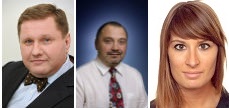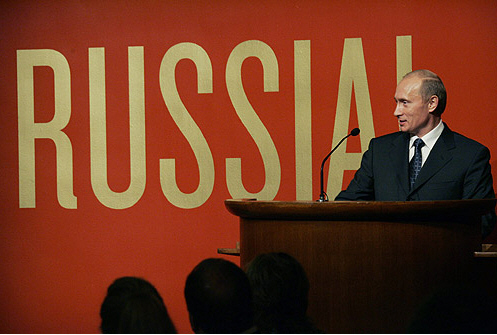 Russia’s actions in Ukraine should better be ascribed to a quest for domestic legitimacy than an over-arching plan of antagonising the West. But if cornered, Putin could represent a threat to the Baltics, the Balkans and further. LSEE’s Tena Prelec speaks to Konstantin Von Eggert and Nikolay Petrov.
Russia’s actions in Ukraine should better be ascribed to a quest for domestic legitimacy than an over-arching plan of antagonising the West. But if cornered, Putin could represent a threat to the Baltics, the Balkans and further. LSEE’s Tena Prelec speaks to Konstantin Von Eggert and Nikolay Petrov.

Putin’s aggressive posturing in Ukraine has taken its toll. In spite of his sky-high popularity, rumours are building up about the Russian president’s days in politics being shorter than they appear on paper.
Should this prove right, the likelihood of an après moi le déluge scenario following Putin’s demise looks high. After all, the politicians around Putin lack legitimacy on their own, while recent events have knocked the main opposition candidates out of play: the arrest of Navalny and the 3-and-a-half-year jailing of his brother, Prokhorov’s resignation from his own party over an extremist branch, Khodorkhovsky’s fear of returning to Russia after a decade in prison, and of course Nemtsov’s murder. Against such a background, it is not surprising there are rumours of a coup.
What are we missing in Russian foreign policy? And what next? Konstantin Von Eggert, a Russian journalist and commentator currently with Kommersant FM, and Nikolay Petrov, an analyst and academic, think one should not look far beyond the internal politics of Russia for an answer.
Not so much of a foreign affair
According to Von Eggert, what Western commentary seems not to grasp about Russian foreign policy is that the foreign aspect of it is, in fact, very much a domestic one. That is why most of the reams written analysing Moscow’s actions last year completely missed the point. He explains: “If you look at it from a geo-strategic point of view, a lot of what Putin did was completely senseless. But if you look at it keeping in mind the domestic prestige of the regime, the legitimacy of the Kremlin, it makes complete sense. You start realising that most of Russia’s foreign policy – and here Ukraine is really the best example – is, to a large extent, domestic“.
The main components of Russian foreign policy are, for Von Eggert, the defence of very traditional interests – such as preventing a nuclear war or preserving territorial integrity, exacerbated by Russia’s many contested borders – coupled with the fact that national interests are, to a large extent, replaced by the interests of the ruling elite, which represents only a fraction of the whole population.
The ruling elite’s two main interests are keeping its grasp on power and promoting its own well-being. “Fostering the interests of the elite therefore equals to promoting the interests of Gazprom, Rosneft, and the like”, he says. In a wider sense, it also means that the elite’s policy is focused on keeping Western influences at bay, because the Kremlin is concerned with “anything that smells of democracy near Russia, as it knows that returning to a 1990s type of setting would mean that most of these people are finished.” Tying up the hands of the West and controlling the post-Soviet space are closely linked to this fear. There is the staunch belief that America and the EU want regime change in Russia and that they operate via Russia’s neighbouring states in their attempt to achieve it. “So this makes the Ukrainian crisis a domestic crisis. This makes Ukraine a domestic issue, not only about legitimacy, but about keeping power”, Von Eggert concludes.
Misunderstanding Russia’s actions can be very counterproductive, Petrov is convinced. He believes that the first wave of EU-US sanctions – the ones that punished close associates of the Kremlin– ended up acting in Putin’s favour, by solidifying the fence between Russia and the West that he strives to create. “To say that Timchenko, Rotenberg and others within Putin’s close circle are “bad guys” not only served Putin’s intent in keeping the image of Russia as a besieged fortress, but it also reinforced his assertion that the West does not act on any legal grounds, only making choices based on somebody’s taste”. In contrast, the last wave of sanctions is having a more effective impact due to a combination of factors (first and foremost, the fall in oil price), Petrov believes. “It is important however to understand that the effect of these sanctions will not be immediate”, he warns.
The opposition and Putin’s last reincarnation
The 2011-12 protests were a watershed in Putin’s Weltanschauung. Von Eggert: “In Putin’s view, the young professionals angrily tweeting from Bolotnaya square and Prospekt Sakharova did so from iPads and iPhones bought with money he gave them”. Putin has presided over a period of great economic growth, fuelled by a high oil price, in sharp contrast with the abject penury of the Yeltsin years. He believes he has given the Russian people unprecedented prosperity – riches that in 2011-12 they used against their benefactor.
Since then, “Putin realised that he is no longer the emperor of all Russians; he is now only the emperor of the right Russians, and the wrong Russians will be there only as long as he tolerates them”, Von Eggert explains. But marginalising the active minority is a double-edged sword for every Russian leader, he says: “The imperial government behaved like that in 1917, the communists did the same in 1991 – and we all know how it ended. The active minority is always there, it is impossible to eradicate it completely. Pushing it out, sooner or later, inevitably prompts the same reaction: ‘since you don’t want us to play by your rules, we will write our own’”.
Petrov believes that Putin paid for his choices by “using up his political time very quickly”, meaning that the several years in politics he had ahead, according to many experts, are now much reduced. Democratic legitimacy (or what was left of it) was substituted by military mobilisation legitimacy. Upon arrival at this point, changing course was no longer possible. The sudden drop in oil price and subsequent economic crisis also meant that the pie to be shared has become much smaller – a major cause of discontent among members of the elite.
“Usually legitimacy follows a bottom-up trajectory”, says Petrov, “in which elites play a very important role because they are the link between the population and the leader, as they are the ones who need to deliver votes to the top. In this new top-down legitimacy, Putin’s dependence on political elites is much lower”. As a consequence, the ability of the elites to influence Putin and the influence of citizens on the elites is reduced. The political mechanism no longer works effectively”.
We thus may be currently witnessing Putin’s last incarnation: as Commander-in-chief of Fortress Russia. In Von Eggert’s words: “What we have seen in the last year is probably the final stage in the evolution of Putin’s regime and of his search for legitimacy, the final roll-out: a Commander-in-Chief whose legitimacy is based not on being able to deliver anything domestically, but on being the only person that stands between Russia and the foreign chaos”.
What next?
The feeling that Putin’s days in politics are coming to an end does not square up with his ever-high approval ratings – currently hovering well above 80%. Is this realistic? “I believe that in politics, as in physics, a vacuum always needs to be filled. Putin won popularity, but had to pay for it”, says Petrov.
If this is indeed Putin’s last reincarnation, it is still unclear how this transition is going to happen. Elections are not an option: “In Russia, elections have never decided the country’s leader”, says Petrov. “The usual course of events is for the elite to choose a leader, whose appointment is then sealed by the polls. But after Putin there can only be chaos, since politicians linked to him lack independent legitimacy”.
In a situation of chaos, Petrov believes that the forces able to organise themselves most quickly – not those that are largest in number – will be the ones that gain most. He thus sees two options: hard-line nationalists teaming up with part of the security services, or Chechnya’s steel-fisted and tiger-hugging leader Ramzan Kadyrov seizing power in Russia.
Von Eggert sees a different scenario. ‘When chaos hits Russia, do not underestimate the power of the law’, he warns. Here ‘law’ is intended not to mean a profound sense of justice, but rather the rules that govern the game. “There will be a race to the meticulous interpretation of all legal provisions”, he says, “And with Putin out of the picture, the legal successor is one: Medvedev”.
In waiting for the succession to play out, the danger of Putin’s actions cannot be taken too lightly. Because of his much reduced dependence on the elites, Putin now acts like a tsar: “If you put him into a corner, everything is possible”, Petrov warns. Could he represent a danger to the Baltics or even the Balkans? Petrov goes further: he believes Putin could be a danger to the world. “A cornered Putin could act madly: so far his actions have been rational – perhaps not democratic, not liberal, not understood in full by the West, and yet fully rational – but he could start behaving irrationally and become a threat to the world. He once told a story about his deprived youth in St. Petersburg. He put a rat in a corner, and the rat attacked him back. This is a good metaphor of what could happen if you put Putin in a corner”.
Note: This article gives the views of the authors, and not the position of LSEE Research on South Eastern Europe, nor of the London School of Economics.
A full transcript of this interview will be published next week on LSE’s EUROPP Blog.
_________________________
Konstantin Von Eggert is a Russian analyst, consultant and commentator. He is presenting a current affairs programme on Kommersant FM, Russia’s 24-hour news station. In 2009-2010 Konstantin worked as Vice-President for Public and Government Affairs for ExxonMobil Russia Inc. He is also a former BBC correspondent from Moscow and a member of Chatham House. Awarded MBE in 2008.
Nikolay Petrov was the chair of the Carnegie Moscow Center’s Society and Regions programme. Until 2006, he also worked at the Institute of Geography at the Russian Academy of Sciences, which he joined in 1982.



3 Comments